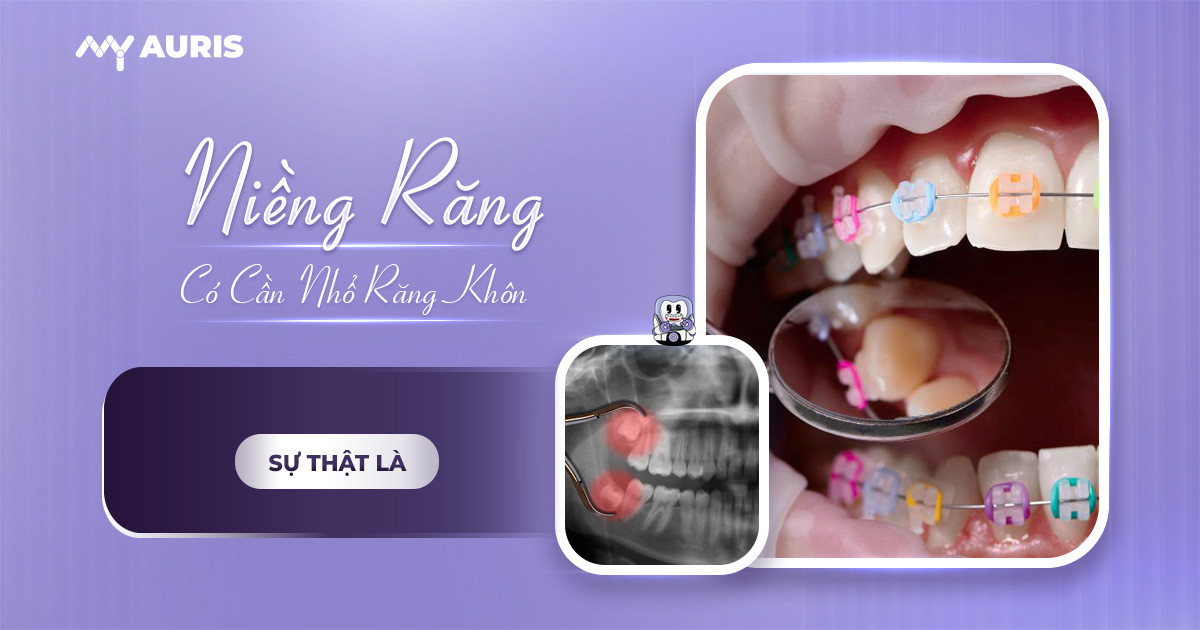Do braces require wisdom teeth extraction?
Do braces require wisdom teeth extraction? Normally, wisdom teeth must be extracted to protect the results of braces, especially when wisdom teeth grow crookedly, piercing the cheek or tooth number 7, causing the teeth to misalign and even distort the bite. Doctors will often prescribe wisdom teeth extraction even if they grow straight to create space for teeth to move, especially in cases of overbite. To not affect the results of braces, wisdom teeth should be extracted first, or you can still have wisdom teeth extracted while wearing braces. This helps ensure optimal orthodontic effectiveness and maintains long-term results..
Does braces require wisdom tooth extraction?
Braces is a traditional orthodontic technique. The treatment plan needs to consider the angle of wisdom tooth eruption. If wisdom teeth are crooked, impacted, or affect tooth movement, the orthodontist may recommend wisdom tooth extraction. Keeping wisdom teeth in this case causes complications. On the contrary, if wisdom teeth grow straight, there is no need to extract them. A reputable dental center will take dental X-rays and simulate braces to make an accurate decision. The time and cost of braces are also affected by this decision.
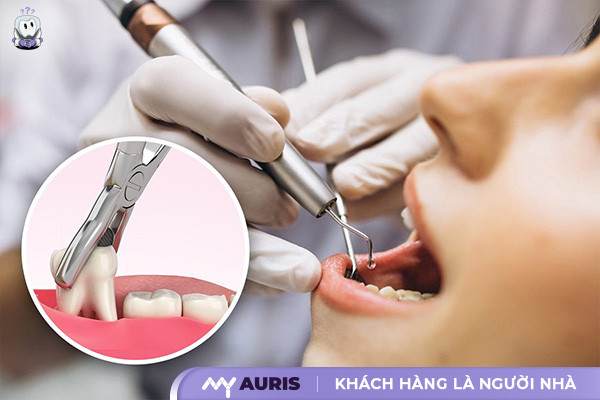
Does Invisalign braces require wisdom tooth extraction? no?
Invisalign is modern braces technology. The decision to remove wisdom teeth is also based on the location and impact on other teeth. Braces do not need to be extracted if wisdom teeth do not cause problems. Modern dentistry prioritizes tooth preservation. Avoid tooth extraction when not necessary. However, if wisdom teeth grow horizontally or backwards, the doctor will still recommend extraction. The best results of braces are when the condition of the teeth is thoroughly evaluated.
Do upper braces require wisdom teeth extraction?
When braces are applied to the upper jaw, wisdom tooth extraction depends on the angle of growth and the impact on the incisors, canines, and premolars. If wisdom teeth grow crookedly, causing pain and pressure on other teeth, the tooth needs to be extracted. Dental treatment requires careful consideration. Dentistry will analyze X-rays and simulations to come up with an optimal treatment plan. Upper jaw braces do not need to be extracted if wisdom teeth do not cause problems.
Do lower wisdom teeth need to be extracted for lower jaw braces?
Similar nbraces on the upper jaw, wisdom teeth extraction on the lower jaw depends on the condition of the teeth. If wisdom teeth grow late, are difficult to clean, and cause inflammation around the wisdom teeth, the doctor will prescribe extraction. Keep wisdom teeth only if they do not affect molars and braces plans. Dentistry always prioritizes the method of preserving maximum teeth.
Does braces for adults require wisdom teeth extraction?
Adults often have problems with wisdom teeth growing crooked or impacted. The decision to remove wisdom teeth while braces requires careful consideration. The dentist will evaluate the risk of complications that affect the results of braces. If wisdom teeth pose a risk of cysts, extraction is necessary. Braces planning for adults needs to consider comprehensive oral health status.
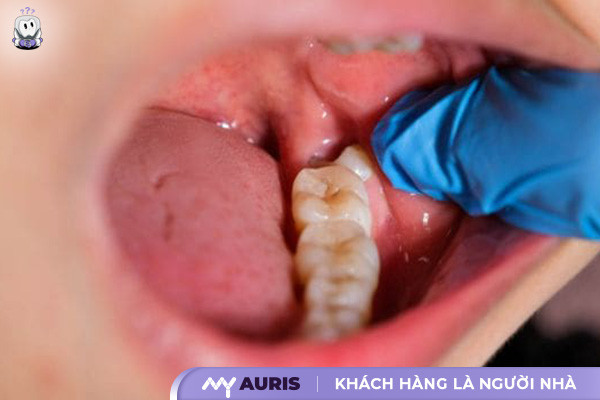
When do you need to extract wisdom teeth for braces teeth?
Wisdom teeth that are crooked, impacted, growing horizontally, or growing backwards are cases that are often prescribed for extraction before braces. Inflammation around the wisdom teeth, pain, and difficulty cleaning are also signs that wisdom teeth need to be extracted. This condition affects the orthodontic treatment plan. The orthodontist will consider the growth position and angle of the wisdom teeth to make a decision. The goal is to create space for teeth to move, ensuring optimal braces results.
Benefits of wisdom teeth extraction when braces
Removing wisdom teeth when necessary helps create space for teeth to move, preventing teeth from shifting after braces. This minimizes the risk of complications such as inflammation around the wisdom teeth and cysts. The results of braces will be more stable and aesthetic. Regular teeth and accurate bite bring medical, aesthetic, psychological and economic benefits.
When do you need to remove wisdom teeth for braces?
Many people wonder whether braces require wisdom teeth extraction. Some people want to keep their wisdom teeth and avoid tooth extraction. However, keeping wisdom teeth in some cases can affect the results of braces and even cause complications. The decision to extract or keep wisdom teeth depends on many factors, requiring careful evaluation from an orthodontist. Lack of understanding about this issue makes many people worried, making it difficult to make appropriate decisions.
Each person’s dental condition is different. Wisdom teeth that grow crooked, impacted, grow horizontally or grow backwards can cause inflammation around the wisdom teeth and painc, creates pressure on other teeth, affecting the entire tooth. During the braces process, orthodontic techniques that move teeth require space. If you keep your wisdom teeth when there is not enough space, they can press on other teeth, causing them to shift, affecting the results of braces and making oral hygiene difficult. In the long term, impacted wisdom teeth can cause cysts, affect the jawbone, and even require more complicated surgery. This affects your health, aesthetics, psychology and economics. Braces time may also take longer than expected.
Based on dental X-rays and braces simulation, the orthodontist at the dental center will evaluate the tooth condition, growth position and angle of wisdom teeth. Below are some cases where wisdom teeth need to be extracted:
- Wisdom teeth growing crookedly, impacted, growing horizontally, growing backwards: Incorrect growth angle affects other teeth, causing difficulty in cleaning, risk of infection and cysts.
- Not enough space on the jaw: Wisdom teeth grow late, not enough space on the jaw, causing crowding, shifting of teeth, affecting braces plans.
- Treatment plan that requires tooth extraction: In some cases, to achieve the best braces results, the orthodontist will need to create space by extracting teeth, including wisdom teeth.
- Wisdom teeth cause pain and inflammation: Dental treatment, including wisdom tooth extraction, is necessary to ensure oral health.
However, wisdom teeth extraction is not always necessary. If the wisdom teeth grow straight, have enough space in the jaw, do not affect other teeth and do not cause complications, the doctor may decide to keep the wisdom teeth. Braces without wisdom tooth extraction is completely feasible in this case.

Benefits of Wisdom teeth extraction while braces
Wisdom tooth extraction before braces brings many practical benefits to the treatment plan. This optimizes braces results and protects long-term oral health.
Creates space for teeth to move
Wisdom tooth extraction creates space for Other teeth move more easily during braces. Wisdom teeth usually grow last, when the jawbone has broken downfully developed. The growing position of wisdom teeth is often at a difficult angle, easily causing crowding, affecting the incisors, canines, premolars and molars. Removing wisdom teeth gives the orthodontist enough space to realign other teeth, achieving optimal orthodontic results. This process is clearly shown on dental X-rays and braces simulation.
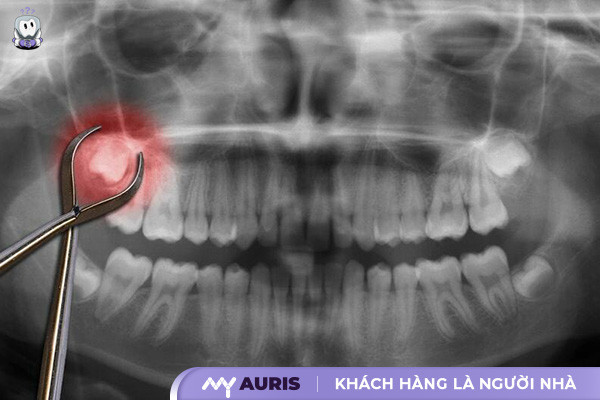
Preventing teeth from shifting later Braces
Wisdom teeth that are crooked, impacted, growing horizontally, or growing backwards can put pressure on other teeth, causing misalignment after braces. Removing wisdom teeth before braces helps eliminate this risk, maintaining long-term, stable braces results.
Limits the risk of dental complications
Keep wisdom teeth, especially when teeth are crooked, difficult to clean, increasing the risk of inflammation around wisdom teeth, cysts, affecting the jawbone and neighboring teeth. Wisdom tooth extraction helps eliminate this risk, protecting oral health.
Improves aesthetics and chewing function
Braces combined with wisdom tooth extraction when Necessary will bring beautiful teeth, improve facial aesthetics, and support effective chewing function. This has a positive impact on your psychology, helping you be more confident in communication.
Simplify the braces process, shorten treatment time
In some cases, wisdom tooth extraction helps simplify orthodontic techniques, shorten braces time, and save time and costs.
Risks Risks and complications when keeping wisdom teeth during braces
Understanding the risks helps you be more proactive in your braces plan, achieve desired braces results and protect the best oral health.
Lack of space, affecting the results of braces
Moving teeth is a core element in orthodontic techniques. When braces are applied, the orthodontist moves the teeth to the correct position on the jaw. Wisdom teeth grow late, often lacking space, causing crowding and shifting of other teeth. Keeping wisdom teeth in this case limits the effectiveness of tooth movement, affecting the outcomebraces. Braces simulation and dental X-rays help doctors and patients clearly visualize the condition of teeth, jawbone, and wisdom tooth growth angle, thereby planning appropriate treatment. Modern dentistry uses advanced braces technology to maximally support the treatment process.
Causes complications of inflammation around wisdom teeth
The growing position of the tooth Wisdom teeth are often difficult to clean. Food can easily get stuck, creating a favorable environment for bacteria to grow, causing inflammation around the wisdom teeth. This condition causes pain, affects chewing function, and even spreads, causing infection. During the braces process, oral hygiene becomes more difficult, increasing the risk of infection. Wisdom tooth extraction is a necessary solution in this case. A reputable dental center with experienced orthodontists will provide an optimal treatment plan, ensuring safety and effectiveness.
Creating pressure, affecting adjacent teeth
Wisdom teeth that grow crooked, impacted, grow horizontally, or grow backwards can put pressure on adjacent teeth, especially the second molars. This pressure causes pain, bone loss, and even damage to adjacent teeth. Braces in this case increase pressure, causing serious damage. The current wisdom tooth extraction process is quite safe, complications of wisdom tooth extraction are well controlled. Proper oral care after tooth extraction helps the wound heal quickly. Braces methods such as braces and Invisalign braces can be combined with wisdom tooth extraction when necessary.
Risk of cysts, affecting jaw bone
Impacted wisdom teeth can form cysts in the jawbone. Cysts grow silently, causing bone loss and affecting jaw structure. Detecting and treating cysts promptly is important. Dental X-rays help determine the location and size of the cyst. Minor surgery to remove cysts and wisdom teeth is necessary to protect jaw health. The cost of braces and wisdom tooth extraction depends on the condition of the teeth, braces time and treatment method. Consult with your dentist for more details about the braces plan, cost and treatment time.
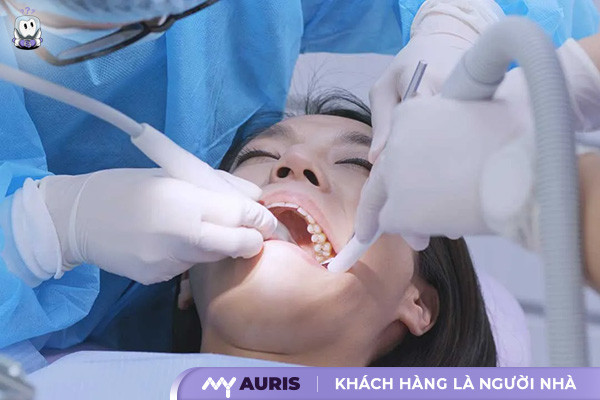
Regulations Wisdom tooth extraction before or during braces
Wisdom tooth extraction before or during braces helps the treatment plan go smoothly and achieve optimal aesthetic results. Methodical process, minimizing complications of wisdom tooth extraction.
- Examination and consultation:
The orthodontist at the dental center will examine, take X-rays of the teeth, evaluate the oral condition, the angle of wisdom tooth eruption, and its impact on the braces plan. The doctor will advise and explain orthodontic techniques, benefits, and risks of keeping wisdom teeth or removing wisdom teeth. Braces technology and braces simulation will help you better visualize treatment results. Braces methods such as braces and Invisalign will be discussed. The cost of braces and braces time are also important issues to discuss.
- Treatment planning:
Based on the examination results, the doctor will create a detailed treatment plan. This plan includes time, cost, braces method, tooth extraction process (if necessary), and oral care after tooth extraction. This plan helps you understand the entire dental treatment process.
- Wisdom teeth extraction (if necessary):
If wisdom teeth need to be extracted, the doctor will perform minor surgery. The wisdom tooth extraction procedure is performed by a qualified doctor. After tooth extraction, you need to follow post-extraction oral care instructions to avoid complications.
- Braces:
After wisdom teeth are extracted (if necessary) and the wound heals, the doctor will proceed with braces according to the proposed plan. The duration of braces depends on the condition of the teeth, the position of the teeth, and the orthodontic technique used.
- Monitoring and re-examination:
During the braces process, you need to have regular re-examination according to your doctor’s appointment. The doctor will monitor and adjust the treatment plan if necessary, ensuring the best braces results.
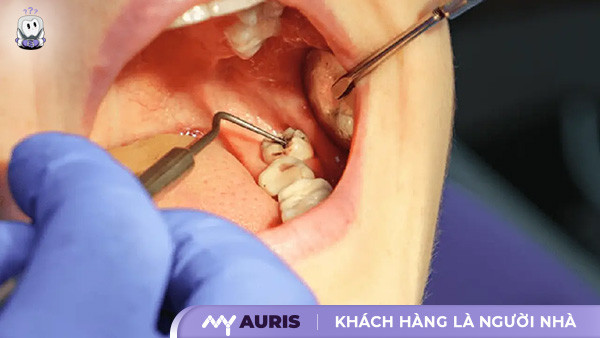
Cost of wisdom tooth extraction and braces: Smart choice for smile and health
Understanding the cost helps you be the owner Be more active in your dental treatment plan, achieve the best braces results without financial surprises.
The cost of wisdom tooth extraction
The cost of wisdom tooth extraction depends on many factors. Growth location, tooth condition, and growth angle affect the complexity of minor surgery. Wisdom teeth growing crooked, impacted, or growing horizontally are more complicated than normal teethgrow straight. Dental center, technology, orthodontist are also factors that determine cost. Reputable dentistry, modern equipment, and good doctors often have higher costs.
The wisdom tooth extraction process includes examination, dental X-rays, minor surgery, medications, and follow-up examinations. Each phase has its own costs. The dentist will advise you in detail on the treatment plan and costs before implementation. You should compare costs between dentists, learn carefully about the services, and avoid unexpected costs. Don’t just rely on the cheap price and ignore the quality of treatment.
Normally, the cost of removing a wisdom tooth ranges from a few hundred thousand to several million dong. The cost of extracting four wisdom teeth will be higher. Some dentists have incentive and discount programs. Please research carefully to save costs.
Cost of braces
Braces have many methods: metal braces, ceramic braces, Invisalign clear braces. Each method has its own costs, advantages and disadvantages. Metal braces are a traditional method with lower costs. Invisalign clear braces are more aesthetic, more comfortable, but cost more. The cost of braces also depends on the length of braces, the condition of the teeth, and the complexity of the braces plan.
The average braces time is from 18 to 24 months. Complicated teeth conditions such as overbite, underbite, and misalignment will require longer braces time and higher costs. The detailed treatment plan will be consulted by the orthodontist after examination, X-rays, and braces simulation. Braces simulation helps you visualize the results of braces and choose the appropriate method.


